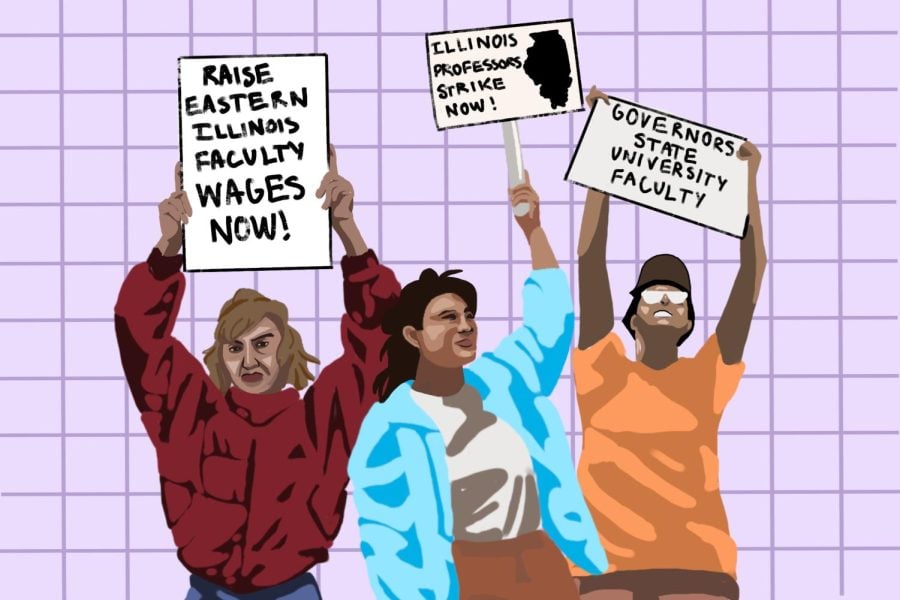Three public Illinois universities strike over contract negotiations, reflects increased labor activity in state
Unions at Chicago State University, Governors State University and Eastern Illinois University have all gone on strike over contract negotiations this month.
April 17, 2023
Members of the Eastern Illinois University union came to a tentative agreement with the university administrators Thursday, while unions at Chicago State University and Governors State University remain on strike.
Unions at the three Illinois public universities went on strike in early April after contract negotiations with their respective administrations fell through, primarily over increasing faculty pay. These movements come amid strikes at other institutions in the country, most notably at Rutgers University. Three unions at Rutgers went on strike last week.
After a six-day strike at EIU, members of the institution’s University Professionals of Illinois Chapter decided Thursday to suspend the strike to evaluate the administration’s “last, best, final offer,” according to a press release from the union. However, the bargaining team did not endorse the university’s financial offer, since it did not provide union members the opportunity to do work they missed during the strike.
“Our members knew that we had to consider this package despite the cost to our own financial well-being because we know that improving conditions for our advisors, counselors and faculty means improving the learning environment for all of our students,” the EIU union’s lead negotiator Billy Hung said in an email news release.
The CSU Chapter of the University Professionals of Illinois has been officially bargaining with administration since last June, calling on the university to raise wages. In March, union members voted to strike if a deal wasn’t met in future bargaining sessions with the university.
Ernst Coupet, a member of the bargaining team in CSU’s union, said contract negotiations have centered on a few key issues, including increasing faculty salaries to keep up with the pace of inflation.
“We came here because we love the mission,” Coupet said. “But we’ve been letting the institution just drive our real wages down too far. So enough is enough.”
Data from the Illinois Board of Higher Education show that faculty at CSU, a predominantly Black institution, are among the lowest-paid public university faculty in Illinois. Professors at Chicago State earned $88,000 on average in the 2021-22 academic year, $7,000 less than the state average for public university professors, according to a report from the National Education Association cited by the union.
In a statement, CSU administration said it had “achieved agreement on significant issues” with the union, while acknowledging “the financial realities at the University” which limit its ability to meet the union’s proposals.
GSU’s chapter of UPI went on strike last Tuesday following failed contract negotiations with the university.
Mike Hart, the GSU UPI President, echoed similar concerns about faculty salaries failing to keep up with inflation.
Union members at Northeastern Illinois University may also strike soon, based on a recent vote by members. On Thursday, 95% of union members voted to strike if an agreement is not met with administration officials regarding working conditions and wages.
All three strikes came less than three months after the UIC United Faculty at the University of Illinois Chicago reached a tentative contract agreement with school officials following their strike over compensation.
Aaron Krall, union president at the University of Illinois Chicago, said the recent strikes reflect a “reinvigorated higher education labor movement” in the U.S.
He said the wave of strikes results from disinvestment in public higher education institutions in Illinois. The state halved its spending on public universities between 2000 to 2023, according to a report from the Center for Tax and Budget Accountability. Krall said the pandemic has also led many workers to reevaluate how they are treated by the institutions they work for.
Rosemary Feurer, an associate professor at Northern Illinois University, said labor laws in Illinois are “less restrictive” compared to other states, so unions have greater freedom. Feurer referenced the Educational Labor Relations Act and the Workers’ Rights Amendment, which was enshrined into the state constitution this past year and gives workers the right to collectively bargain.
Despite Illinois’ protections for striking workers, Krall said unions still face great resistance at state universities.
“We are in a state that’s very labor friendly,” Krall said. “And yet, our public universities really have not have not been very friendly to labor. And I think that’s something that’s going to have to change.”
Related Stories:
— Chicago State University faculty goes on strike, other Illinois universities to follow
— Evanston union workers celebrate success of Illinois ‘Workers Rights Amendment’
— Main Street Starbucks votes 12-0 to unionize
Email: katewalter2025@u.northwestern.edu
Twitter: @katewalter03


